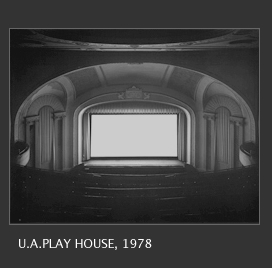Endless rivers of information race past us each day. People, conversations, messages, calls, sports and news TV channels no longer content to simply 'present' the game or the top stories, but also have to Image - Hiroshi Sugimoto stream a unrelenting flow of information on other games being played and other stories that you may have missed. As I write this I am watching a professional football game on TV, and in addition to the actual game coverage, the following supplementary information is super-imposed on the screen:
Image - Hiroshi Sugimoto stream a unrelenting flow of information on other games being played and other stories that you may have missed. As I write this I am watching a professional football game on TV, and in addition to the actual game coverage, the following supplementary information is super-imposed on the screen:
- The score of the current game
- The time remaining in the game
- The down number and number of yards to make to achieve a first down
- The name of the network broadcasting the game
- Computer generated lines showing the where each play begins and the yard to make to achieve a first down
- A constantly updating scroll of scores from all the other NFL games being played, also displaying the time remaining in each game
- A steady stream of graphics with statistical information such as the number of yards a given player has gained, or various individual and team accolades.
- Occasional graphics previewing upcoming shows on the broadcast network
All that additional clutter information more or less adds to the overall presentation, increases (mostly) the viewers enjoyment of the game, and can benefit the broadcaster by keeping the viewer's attention for a longer period and decreasing the likelihood they will switch to another game or show.
But it is a ton of extra data to process, and while it does seem likely in this hyper-connected digital age that we are getting better as multi-tasking and complex processing, I wonder if we can at time miss the very nature of what we are trying to see and understand by keeping one eye always on what else is happening.
The image included in this post is taken from a collection by the photographer Hiroshi Sugimoto. The collection is called 'Theaters', and the photos were created by taking long-exposure photographs of cinema screens for the entire duration of a movie, resulting in a blank white screen, that varies in brightness and intensity according to the overall mood of the film. If the movie was light, and happy; a brighter screen emerged, dark or horror movies resulted in a much more subdued and drab screen.
Certainly the images created by Sugimoto don't tell us much about the original film from which they were based. The screen in the photograph is essentially blank, the only piece of information we can deduce is the relative mood of the piece (maybe), by comparing the brightness across a set of images from many films.
But in a way perhaps these images, while not being a good substitute for the original film presentation do offer an important and possibly compelling complement. While we watch a film, especially a modern one full of fancy computer generated effects, it can be very easy to become enthralled by these effects, by the fast flowing stream of characters, settings, action scenes, music etc. We can often leave a movie thinking more about individual or isolated elements of the presentation, sometimes missing the larger message (if there is one), or redeeming or lasting lesson.
I think there may be a case, whether it is watching a sports broadcast on TV, catching a movie in a theater, assessing and interpreting the news of the day, and certainly making sense of the incredible volumes of data, links, updates and other by-products of this connected world that more than ever the need to step back, open the camera shutter, and observe long enough to get a better sense of the big picture will be an important and vital skill.
What do you think? Are we losing focus in the barrage of information?